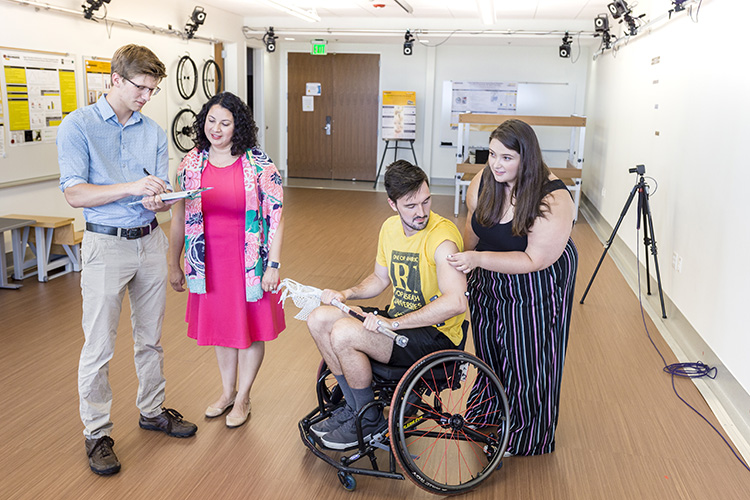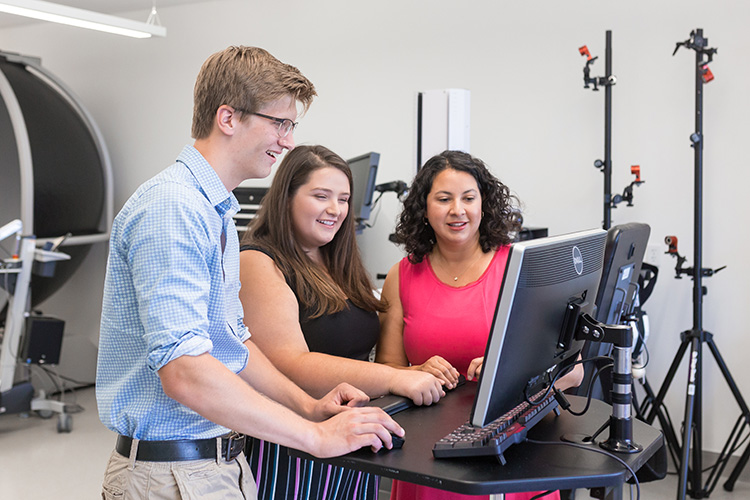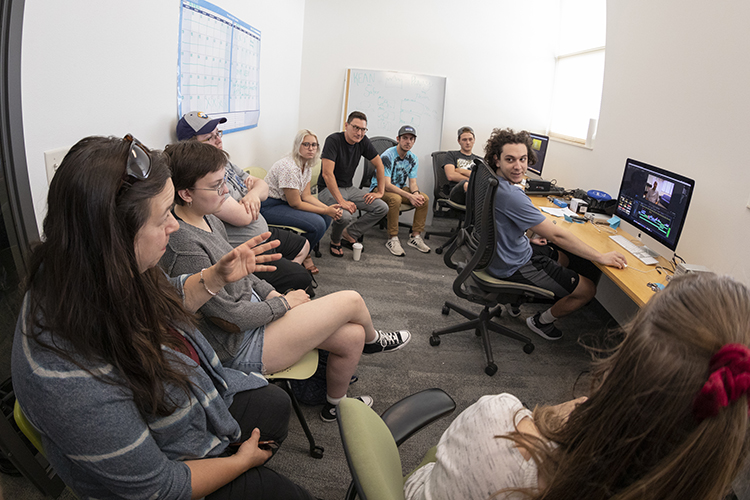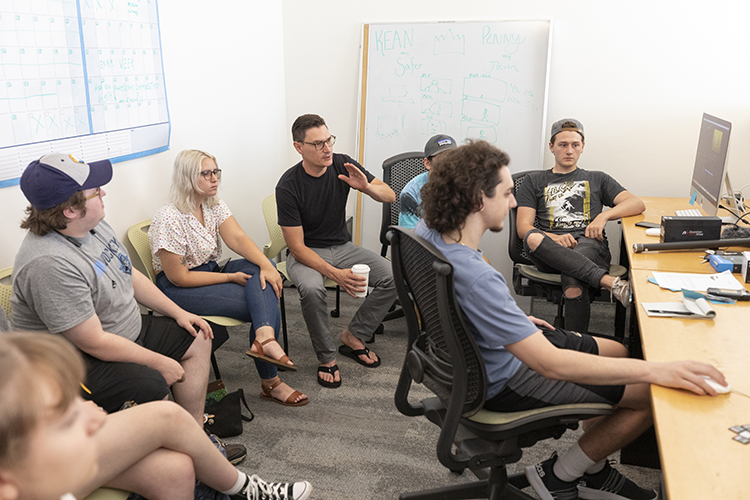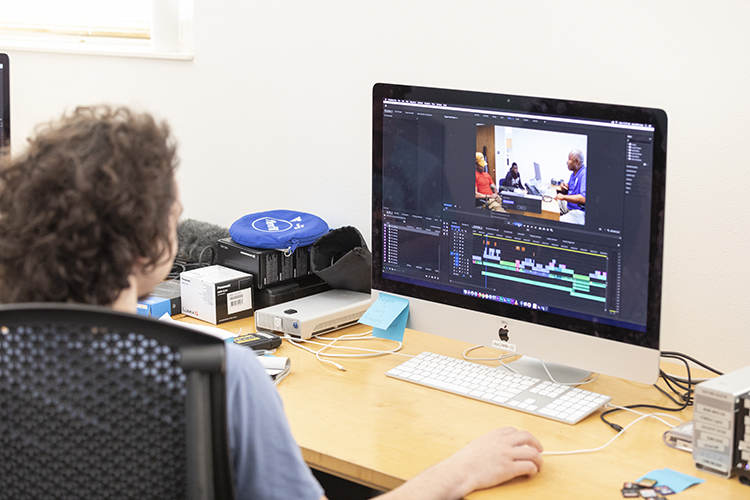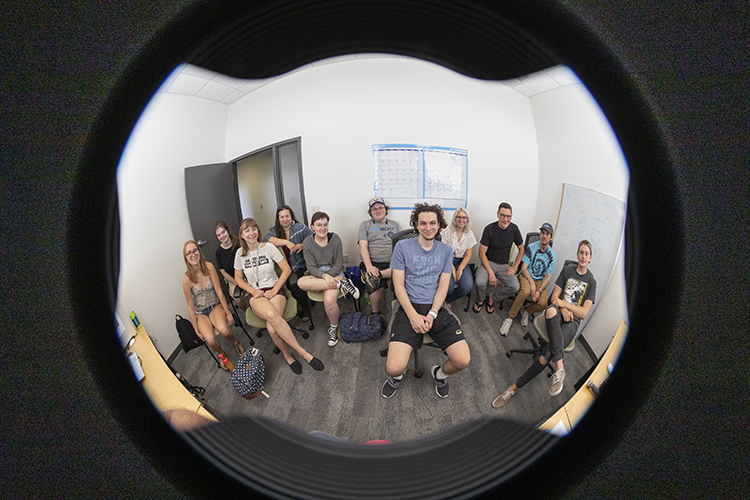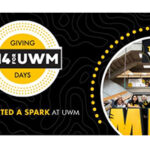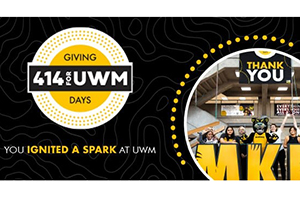Some two dozen UWM incoming undergraduates have dedicated much of their last summer before college to jumpstarting their academic careers, doing meaningful research in areas ranging from safe sleep for infants to engineering self-healing materials.
Twenty-seven students out of 100 applicants were accepted into the 11th summer of the UR@UWM program, hosted by the Office of Undergraduate Research. Students are paired with one of 17 research projects, each with a faculty research mentor. Here they get their first taste of research culture at a university level.
Students spend between 25 and 30 hours a week doing research or fieldwork over the course of a month. Participants attend a seminar twice a week to discuss research articles, ethics and scientific literacy.
The UR@UWM program has offered a variety of hands-on training techniques in a laboratory setting where students work closely with postdocs, graduate students, faculty and other undergraduate researchers.
Researching effects of estrogens
Karyn Frick and her students Grace Geiger and McKenna Anderson are researching the effects of estrogens on learning and memory in mice.
“It’s really useful for students who might be interested in doing research to get a foot in the door and get the process started early,” said Frick, UWM professor of psychology. “They can accumulate enough experience where, by the end of their undergraduate years, they’re doing important things like presenting work at a national or international conference and getting to be authors on publications, which, for graduate applications, are the gold standard.”
UR@UWM students in Frick’s lab are learning how to collect and analyze data used in developing treatments for Alzheimer’s disease, specifically in women.
“Regardless of whether it’s neuroscience or cancer or anything, for us to be able to educate students as they go out into society about the importance of research is crucial,” said Frick.
For Geiger and Anderson, UWM’s research reputation was a heavy influence when applying to universities.
“I have an end goal,” said Geiger. “I want to be a doctor, and this program sets me up for my future.”
An unusual program
Research is an important part of UWM’s mission. In 2018, UWM received the Campus-Wide Award for Undergraduate Research Accomplishments from the Council on Undergraduate Research, and the university maintained its R1 designation, which recognizes the top 131 universities in the nation for outstanding research productivity.
UWM is one of the few universities offering such initiatives so early, according to Kyla Esguerra, deputy director of the Office of Undergraduate Research and creator of UR@UWM.
“We have not yet heard of another program that starts as early as this one,” said Esguerra. “This program bridges the gap between high school and university and is focused on helping high-achieving students get the chance to work with cutting-edge research projects and faculty.”
UR@UWM is aimed at benefiting students and encouraging professional development outside of the classroom. The program helps spread the word to other students about research opportunities that might be significant to them.
“The Office of Undergraduate Research is phenomenally supportive of these students, and they want to see them do well,” said sophomore Tiffany Polzin, who is a continuing undergraduate researcher in Frick’s psychology lab after participating in UR@UWM last summer. “That’s why Milwaukee is unique. A lot of schools do not allow research this early — or even as freshmen — so if you can hop on the opportunity, take it.”
Biomechanical research on lacrosse
Brooke Slavens mentors students John Poppe and Peyton Bendis in the Mobility Lab doing biomechanical research on the overhead throwing mechanics of wheelchair lacrosse players.
For this project, undergraduate researchers learn to identify and understand research questions, analyze data and communicate results that will help Wheelchair Lacrosse USA develop safety regulations for lacrosse as an adaptive sport.
“This is the first time I’ve ever done work in a lab like this,” Poppe said. “It is research that is not just mindless work. It has a purpose and is going to help people.”
Students learn valuable skills in teamwork and community impact through a research partnership with the Medical College of Wisconsin, according to Slavens.
“It has been really fun to train and work with the students knowing they’re going to be innovators and leaders for the next century to come,” said Slavens, associate professor in the College of Health Sciences. “They’ve been very receptive to learning new things and taking on new challenges and have made a lot of progress in the project and for their program.”
Meaningful exploration through undergraduate research engages students in a project where they make lasting connections and establish a foundation for potential graduate school applications and beyond.
UR@UWM is not limited to research in STEM fields, but also explores topics in the arts and humanities.
Helping create documentary films
The Peck School of the Art’s film department is offering its 13th year of the doc|UWM project, where students work on professional film productions for real-life clients and nonprofits in the Milwaukee area.
Program director of doc|UWM Jenny Plevin and project director Sean Kafer lead students in producing a series of both long and short-form documentaries that raise awareness on a variety of social justice topics.
“Having these research students has enabled us to get a lot of our work done, and given some invaluable experience at the same time,” said Plevin. “I think it’s important for students to get hands-on training in filming, editing and producing, and it’s so important to the community and organizations that we work with to have these projects in development.”
Doc|UWM is located downtown in Milwaukee’s newly opened film hub, NōStudios, and is exploring a variety of compelling topics, ranging from environmental projects to Milwaukee’s LGBTQ community. Students gain real-life experience collaborating with clients and working with deadlines and interacting with the community.
“Our project is a little different in the program since it’s not STEM-based,” said Abby Ambrose, a UR@UWM student along with Emily Fedewa, Adelie Content and Zoe Brown. “Our version of research is going out in the community and talking to people and collecting footage, which has been valuable in building confidence as film students.”
Continuing with research through college
More than half of students who participate in the summer undergraduate research program as incoming students continue with similar or more advanced research projects during their academic careers, according to Esguerra. On average during the school year, UWM employs more than 500 undergraduate researchers through several programs.
Senior film major and student research mentor Simone Safian has been working with doc|UWM for the past year and is now pursuing advanced projects that allow for more creative freedom.
“I would definitely recommend getting involved with undergraduate research,” Safian said. “It is a great program because you are able to get the hands-on training that these projects are geared toward and learn from experienced mentors.”
